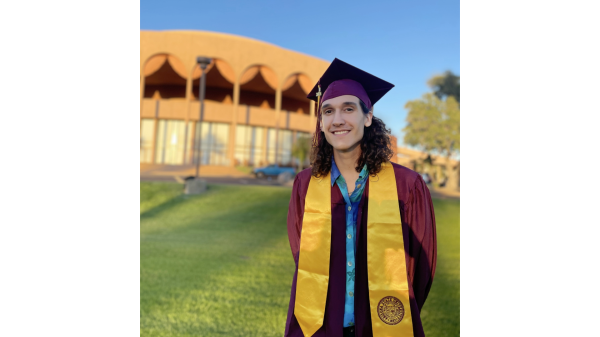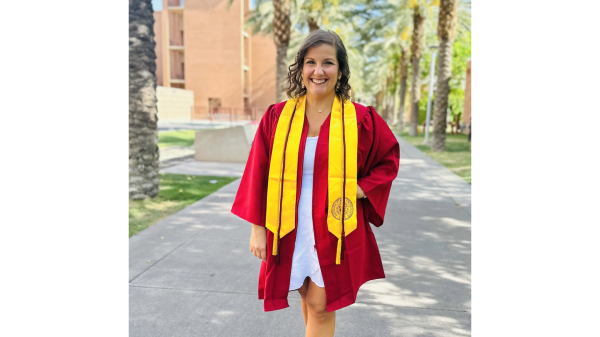Donors to ASU's Bridging Success program help students overcome food insecurity

ASU student Yaritza Hernandez Gil.
When she was in middle school in Phoenix, Yaritza Hernandez Gil realized she had a lot of work to do if she wanted to make it to college.
She was living in Arizona’s foster care system, with little family support.
“I didn’t have anyone to fund my schooling,” she said. “I was a first-generation college student and didn’t even know the process for getting into college.
“I just knew I wanted to get out of the situation. I wanted to focus and do well in school.”
So Hernandez Gil knuckled down on her studies. Mentors at North High in Phoenix provided guidance and motivation, and Arizona State University offered scholarship support.
Her propensity for hard work paid off at ASU. A double major in the School of Sustainability and the School for the Future of Innovation in Society, Hernandez Gil was working two jobs to cover college expenses — until the coronavirus crisis forced her managers to cut her hours.
Like many hourly workers, Hernandez Gil wondered if she could pay her living expenses.
Fortunately, ASU donors stepped in to provide much-needed emergency crisis funding for Hernandez Gil and other students with foster-care backgrounds.
Donors to ASU’s Bridging Success program — which assists former foster youth through the college experience — have provided emergency funding for grocery store gift cards. To date, Bridging Success has provided more than $1,600 in food assistance to 31 students, and is reaching out to more students to assess their level of need.
The impact of the emergency assistance is tangible and immediate.
“It’s tough to not get a paycheck,” Hernandez Gil said. “But this allows me to have meals for myself.”
Students with foster-care backgrounds often face crises on their own, according to Justine Cheung, program manager for Bridging Success. Cheung recently surveyed students in the program, asking them if they have people they can count on financially in this time of social isolation. Sixty percent of the respondents said they had nobody to help.
“They’re always positive because they’re such a resilient group of people, but you can also tell the emotional weight of the situation is very real,” Cheung said.
The Bridging Success emergency crisis fund, when available, also provides students with up to $300 to weather financial shortfalls that impede their ability to stay in school, Cheung said. It has helped students pay for dental emergencies, doctor appointments or the unexpected loss of rent money when a roommate moves out. The fund relies on individual donations to the ASU Foundation's Bridging Success emergency fund cause page.
Students also turn to Bridging Success, based at the Watts College of Public Service and Community Solutions, for emotional, academic and holistic support. While the overarching program receives support from the Nina Mason Pulliam Charitable Trust, ASU donors support many of its services.
For example, its Empower program is funded by Women and Philanthropy, a group of ASU supporters who pool their resources every year to fund research and scholarship at the university.
Empower reaches supportive adult caregivers and youth who want to come to college, offering free online training through videos, downloadable guides, assessments and surveys that help them plan for college. Its Early Start program offers specialized programming to new ASU students, helping them prepare for college life.
Written by Melissa Bordow
More Sun Devil community

ASU graduating student applies AI, deepfake technology in entomology research
Kacy Hatfield, a graduating Master of Science student in media arts and sciences from Arizona State University’s School of Arts,…

Finding his voice: ASU grad takes unexpected turn into sociology
Zachary Cooper, initially a psychology major from Pittsburgh, never imagined that a roommate’s off-the-cuff suggestion would…

How sociology gave this ASU grad a new perspective on patient care
When Brook Schumacher of North Myrtle Beach, South Carolina, started at ASU Online, her plan was clear: earn a biology…